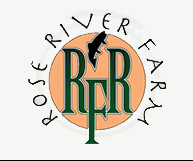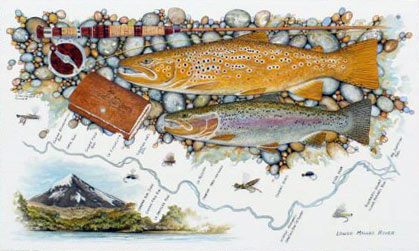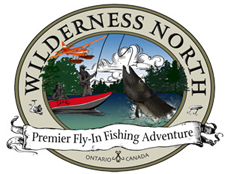Golden Trout, May 2011, Fish of the Month!
 Golden Trout
Golden Trout
Oncorhynchus aguabonita
Local Names:
Golden Trout
Average Size:
8 to 15 inches
½ to 1 pound
Distinguishing Field Marks:
Color and color pattern are reliable distinguishing field marks for this species. (See the illustration.)
-
Typical specimens are nearly uniform golden-yellow.
-
Note the pink or red band along the center of the fish's sides with bluish/purple oval vertical "parr marks."
-
There are only a few dark spots on the body, and these are confined to the back, above the lateral line, and on the tail.
-
The caudal (tail) fin is slightly forked with rounded tips.

-
The anal fin has 11 or 12 rays.
North American Range:
Map to the right shows approximate range in North America.
Diet:
The diet of both juvenal and adult Golden trout is almost entirely immature and adult aquatic insects. This is supplemented by small forage fishes where and when they are available.
Fly Fishing for Golden Trout:
Even from where I sit at this computer, surrounded by un-fishably high central New York rivers and streams (for those of you who know New York’s Salmon River, it’s running at 4000 cfs.) I can sense a sigh of relief from those of you who are following this column that this month we’re focusing on an actual TROUT. But, before you get too excited, remember that, for pretty much all of us, the Golden trout is not to be found in our back yards. In fact, much of the allure of this spectacularly beautiful American original is the trekking to and from its remote high altitude habitats. These waters are nearly all above “timberline.” These ponds, small lakes, and streams provide the Golden trout a high degree of natural habitat protection which is a good thing as these alpine eco-systems are quite fragile and easily disturbed. Choice of transportation modes for accessing Golden trout are; 1. horseback, 2. hiking on foot, 3. mountain biking……take your pick. If you think of yourself as a “couch potato,” you should probably leave the Golden trout fishing to others.
O.K., you got it together to get up the chosen hill to the chosen Golden trout water. If you brought anything heavier than a 5 weight outfit, you’re over-gunned. Think “fragile habitat,” light approach. This goes for spinning as well as fly fishing. Fly fishers have been given a new lease on life for pack-in/pack-out expeditions with the continuing development of VERY user-friendly 4 (or even more) piece fly rods that, when broken down, can be very easily stored for travel and, when re-assembled, cast like standard two piece rods.
What flies? Well, anyone who has a well-stocked arsenal of standard American trout flies, especially midges, dries, and nymphs, has the basis for successful golden trout fly fishing. Beyond that, each water where Goldens are found will have its fly selection idiosyncrasies. The only way to figure these out is to “be there.” Keep in mind that these fish can be quite fussy; come “on the take,” then “go off the take.” Patience and perseverance will be necessary for successful Golden trout fishing…….But, look at it this way; between “bites” take a camera break, or a do nothing R & R break, after all, you’ve done some pretty serious altitude ascending into what are arguably some of the most beautiful places on earth. Don’t let a 10 inch Golden trout’s refusal to bend your rod spoil your outing. And, ALWAYS remember, “Carry it in, carry it out.” Leave no trace…….






